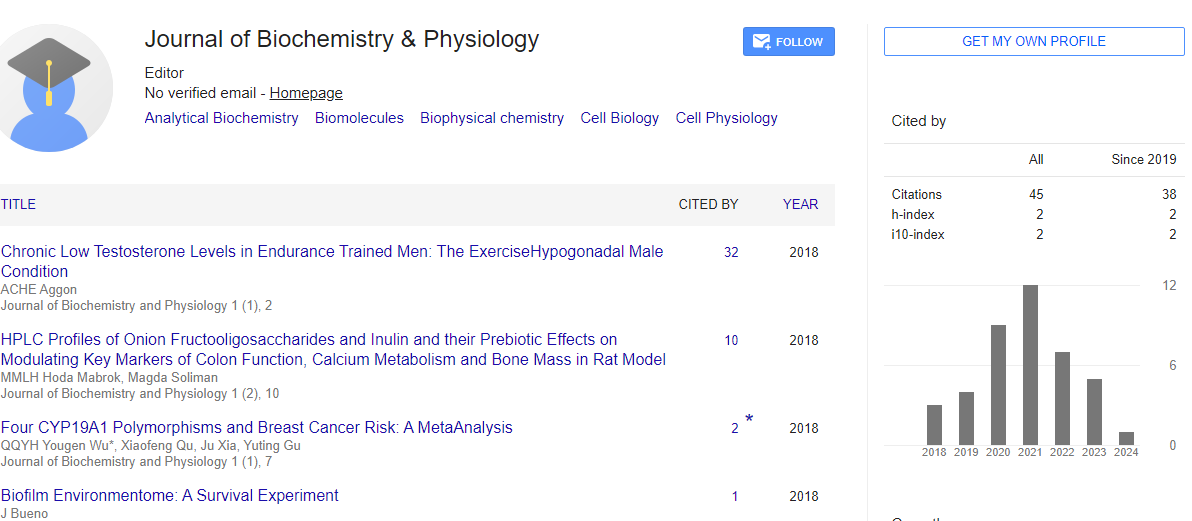Opinion Article, J Biochem Physiol Vol: 6 Issue: 1
Functions of the CD3 Receptor in Immune System
Keung Jung*
1Department of Physiology, School of Medicine, Konkuk University, Seoul, Republic of Korea
*Corresponding Author: Keung Jung
Department of Physiology, School of
Medicine, Konkuk University, Seoul, Republic of Korea
E-mail: keungjung@gmail.com
Received date: 20-Feb-2023, Manuscript No. JBPY-23-93416;
Editor assigned date: 22-Feb-2023, PreQC No. JBPY-23-93416 (PQ);
Reviewed date: 09-Mar-2023, QC No JBPY-23-93416;
Revised date: 16-Mar-2023, Manuscript No. JBPY-23-93416 (R);
Published date: 23-Mar-2023, DOI: 10.4172/jbpy.1000124
Citation: Jung K (2023) Functions of the CD3 Receptor in Immune System. J Biochem Physiol 6:1.
Description
The CD3 receptor is a protein complex that is found on the surface of T cells. It is comprised of several subunits, including CD3 gamma, CD3 delta, CD3 epsilon, and CD3 zeta. The CD3 receptor plays a critical role in T cell activation and is essential for the immune system to function properly. Each subunit of the CD3 receptor is made up of several extracellular domains, a transmembrane domain, and an intracellular domain. The extracellular domains interact with other proteins, while the intracellular domains are involved in signal transduction.
Function of the CD3 Receptor plays an important role in T cell activation. When a T cell encounters an Antigen-Presenting Cell (APC) that has presented an antigen that is recognized by the T Cell Receptor (TCR), the TCR and CD3 receptor undergo conformational changes that allow them to interact with one another. This interaction leads to the activation of the CD3 receptor and the initiation of a signaling cascade that ultimately leads to T cell activation.
The CD3 receptor is also involved in the selection of T cells during development. Immature T cells undergo a process of positive and negative selection in the thymus, which ensures that only T cells that can recognize foreign antigens are allowed to mature and leave the thymus. The CD3 receptor plays an important role in this process it is involved in signaling that leads to the death of T cells that recognize self-antigens.
TCR-CD3 complex on T-lymphocyte cell surface that plays an important role in adaptive immune response TCR-mediated signals are transmitted across the cell membrane by the CD3 chains CD3D, CD3E, CD3G, and CD3Z when Antigen-Presenting Cells (APCs) activate T-Cell Receptor (TCR). In their cytoplasmic domain, all CD3 chains have Immunoreceptor Tyrosine-Based Activation Motifs (ITAMs). These motifs are phosphorylated by the Src family protein tyrosine kinases LCK and FYN upon TCR engagement, resulting in the activation of downstream signalling pathways. In addition to its role in signal transduction in T-cell activation, CD3D is required for thymocyte differentiation. Indeed, it plays a role in the proper intracellular TCR-CD3 complex assembly and surface expression. Thymocytes cannot differentiate properly in the absence of a functional TCR-CD3 complex. Interacts with CD4 and CD8, forming a functional link between the TCR and the coreceptors CD4 and CD8, which is required for T-cell activation and positive selection.
Dysfunction of the CD3 receptor can lead to a variety of immune system disorders. For example, mutations in the CD3 zeta subunit have been associated with Severe Combined Immunodeficiency (SCID), a rare disorder that is characterized by a lack of functional T cells. In addition, some autoimmune disorders, such as Systemic Lupus Erythematosus (SLE), have been associated with abnormalities in the CD3 receptor signaling pathway.
Conclusion
In conclusion, the CD3 receptor is a critical component of the immune system that plays a key role in T cell activation and selection. Dysfunction of the CD3 receptor can lead to a variety of immune system disorders, highlighting the importance of this protein complex in maintaining immune system function the CD3 receptor and its functions continues to evolve, will be better equipped to develop new therapies for immune system disorders and other diseases.
 Spanish
Spanish  Chinese
Chinese  Russian
Russian  German
German  French
French  Japanese
Japanese  Portuguese
Portuguese  Hindi
Hindi 